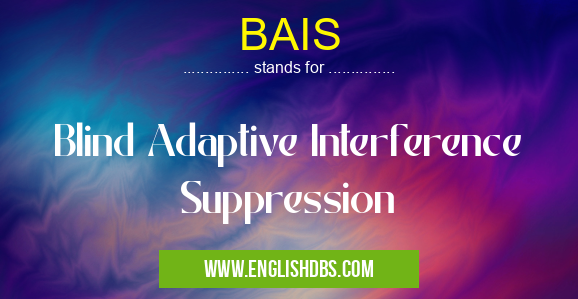What does BAIS mean in UNCLASSIFIED
BAIS (Blind Adaptive Interference Suppression) is an advanced signal processing technique used to enhance signal quality and suppress unwanted interference in various applications, including communications, radar, and medical imaging.

BAIS meaning in Unclassified in Miscellaneous
BAIS mostly used in an acronym Unclassified in Category Miscellaneous that means Blind Adaptive Interference Suppression
Shorthand: BAIS,
Full Form: Blind Adaptive Interference Suppression
For more information of "Blind Adaptive Interference Suppression", see the section below.
What does BAIS Stand for?
Blind Adaptive Interference Suppression
BAIS Meaning
BAIS aims to improve the signal-to-noise ratio (SNR) by adaptively estimating and removing interference without prior knowledge of the interference characteristics. It operates blindly, making it suitable for scenarios where the interference is unknown or highly dynamic.
How BAIS Works
BAIS algorithms utilize statistical signal processing techniques to separate the desired signal from the interference. The algorithm operates in an iterative manner:
- Initialization: The algorithm estimates the interference statistics and initializes a filter.
- Adaptive Filtering: The filter is updated based on the estimated interference statistics and the received signal.
- Signal Estimation: The desired signal is estimated by filtering the received signal with the adaptive filter.
Advantages of BAIS
- Blind adaptation to unknown or changing interference
- Enhanced signal quality and SNR
- Improved performance in noisy environments
- Reduced bit error rate in communications
- Increased detection sensitivity in radar
- Improved image quality in medical imaging
Essential Questions and Answers on Blind Adaptive Interference Suppression in "MISCELLANEOUS»UNFILED"
What is Blind Adaptive Interference Suppression (BAIS)?
BAIS is a technique used in digital signal processing to suppress interference from unwanted signals in a received signal, without prior knowledge of the interference characteristics. It is a blind technique, meaning that it does not require any training data or knowledge of the interfering signal. BAIS algorithms adapt to the changing interference environment, making them robust and effective in various applications.
How does BAIS work?
BAIS algorithms typically employ adaptive filters that learn and cancel out the interference from the received signal. The adaptive filter is updated iteratively, based on the error between the desired signal and the output of the filter. By minimizing this error, the BAIS algorithm suppresses the interference while preserving the desired signal.
What are the advantages of BAIS?
BAIS offers several advantages:
- Blind operation: It does not require any prior knowledge of the interference characteristics.
- Adaptivity: It can adapt to changing interference environments, making it robust and effective.
- Low computational complexity: BAIS algorithms are typically computationally efficient, making them suitable for real-time applications.
Where is BAIS used?
BAIS is used in various applications, including:
- Wireless communications: Suppressing interference in cellular networks, Wi-Fi, and satellite communications.
- Radar systems: Removing clutter and interference in radar signals.
- Biomedical signal processing: Reducing noise and interference in medical imaging and physiological monitoring.
Are there any limitations to BAIS?
BAIS may have limitations in certain scenarios:
- Non-stationary interference: BAIS algorithms may struggle to adapt to rapidly changing interference environments.
- Multiple interference sources: BAIS may not be effective in suppressing interference from multiple sources simultaneously.
- Signal distortion: BAIS algorithms may introduce some distortion to the desired signal, depending on the filter design and adaptation parameters.
Final Words: BAIS is a powerful signal processing technique that has found widespread applications in various domains. Its ability to suppress interference without prior knowledge makes it an effective solution for improving signal quality and enhancing system performance.
